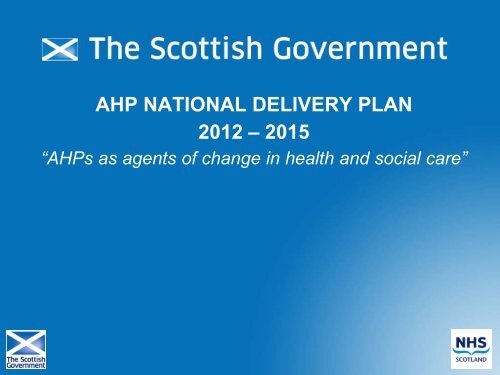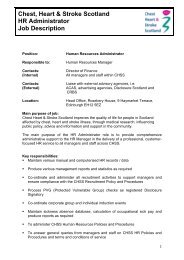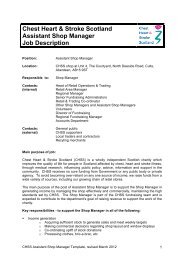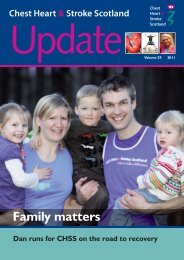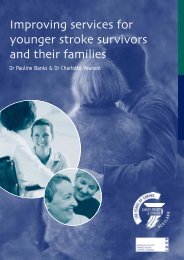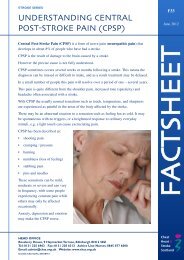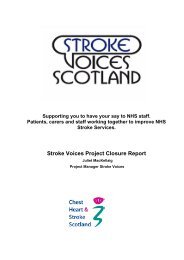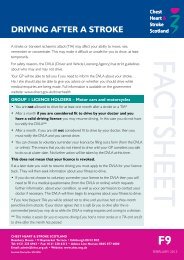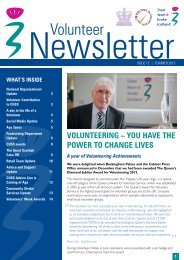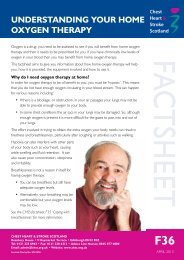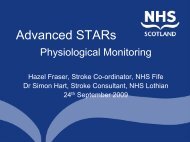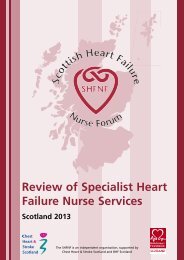The AHP national delivery plan
The AHP national delivery plan
The AHP national delivery plan
Create successful ePaper yourself
Turn your PDF publications into a flip-book with our unique Google optimized e-Paper software.
<strong>AHP</strong> NATIONAL DELIVERY PLAN<br />
2012 – 2015<br />
“<strong>AHP</strong>s as agents of change in health and social care”
20:20 Vision<br />
“<strong>The</strong> demands for healthcare and<br />
the circumstances in which it will<br />
be delivered will be radically<br />
different in future years. We<br />
must be bold enough to<br />
visualise the NHS that will best<br />
meet the needs of the future in a<br />
way that is sustainable and<br />
make the changes necessary<br />
to turn that vision into reality”
Realising 20:20 Vision<br />
<strong>AHP</strong>s will work<br />
increasingly to transform<br />
wellbeing and recovery,<br />
promoting prevention,<br />
earlier diagnosis and<br />
reducing unnecessary<br />
referrals and admissions<br />
to hospital and care by<br />
working upstream to<br />
strengthen user and<br />
carer capabilities and<br />
assets in the communities<br />
they serve.
We have a number of simultaneous shifts<br />
• Patients expecting to be treated as<br />
equals and expert in their own body,<br />
and how their condition affects them.<br />
• Specialist healthcare being delivered<br />
in the community or patients own<br />
home.<br />
• Professional leadership coming from a<br />
range of health professionals, like<br />
<strong>AHP</strong>s.<br />
• Rehabilitation, enablement, supporting<br />
wellbeing and self management<br />
delivering better and more cost<br />
effective outcomes.<br />
Affordable, sustainable<br />
healthcare will depend on us<br />
driving these paradigmatic<br />
shifts through agents of<br />
change.<br />
Integration of health and social<br />
care services is a real catalyst<br />
to accelerate the pace of this<br />
shift.<br />
4
Background<br />
• <strong>The</strong> NDP was<br />
commissioned by the<br />
Minister for Public Health,<br />
with the support of the<br />
Cabinet Secretary for<br />
Health, Wellbeing and<br />
Cities Strategy.<br />
• Universal crossparliamentary<br />
support<br />
• It’s a first for Scotland and<br />
for the UK.
Background<br />
• <strong>AHP</strong>s are the only<br />
professions bringing<br />
expertise in rehabilitation<br />
at the point of registration<br />
• <strong>The</strong> Minister, the third<br />
sector and majority of<br />
respondents wished to see<br />
significant strengthening of<br />
<strong>AHP</strong> Leadership<br />
• This requires corporate<br />
support and recognition of<br />
their role as Agents of<br />
Change across health and<br />
social care
Actions Include<br />
• Each NHS Board to strengthen<br />
and position appropriately the<br />
<strong>AHP</strong> Director post as the<br />
accountable officer for<br />
implementation of the NDP -<br />
CEL 27 (2012).<br />
• <strong>AHP</strong> Directors will drive the<br />
<strong>delivery</strong> of <strong>AHP</strong> waiting times<br />
within 18 weeks from referral to<br />
intervention, inclusive of all<br />
<strong>AHP</strong> professions and<br />
specialities<br />
• <strong>AHP</strong> Directors will drive the<br />
expansion of self referral to all<br />
therapeutic <strong>AHP</strong> services as<br />
the primary route of access
<strong>AHP</strong>s as Agents of Change<br />
Six Action Areas; 27 Actions<br />
1.Professional leadership to drive<br />
innovation and <strong>delivery</strong>.<br />
2.Reshaping care and enabling<br />
independent living.<br />
3.Improving health and well-being.<br />
4.Supporting early years.<br />
5.Maximising workforce engagement<br />
and development.<br />
6.Driving improvement: delivering<br />
sustainable quality.<br />
27/03/2013 <strong>The</strong> NDP: Falls prevention<br />
10
<strong>The</strong> National Delivery Plan for the Allied Health Professions in Scotland<br />
2012 – 2015<br />
May 2013 Update<br />
NDP Situation<br />
<strong>The</strong> National Delivery Plan for Allied Health Professions in Scotland<br />
calls for <strong>AHP</strong>s to be more visible, accountable and impact orientated.<br />
It aligns the <strong>AHP</strong> focus on deliver with the <strong>national</strong>ly agreed outcomes<br />
for integration, and reflects the context of health and social care<br />
integration.<br />
As of March 2012, there were approximately 12,000 <strong>AHP</strong>s working in<br />
acute and primary care setting across NHS Scotland. <strong>The</strong>re were also<br />
around 500 <strong>AHP</strong> practitioners in social care, predominantly<br />
occupational therapist who, despite comprising only 1% of total social<br />
care workforce, addressed 35% of all adult referrals.<br />
NDP Key Milestones<br />
- Nov 2011, Parliamentary Debate on Rehabilitation<br />
- Dec 2011, NHS Lanarkshire go-live with MSK MATS<br />
- May 2012, CAP Training National Leads<br />
- Jun 2012, Launch of NDP<br />
- Oct 2012, NHS Board NDP Self Assessments Complete<br />
- Oct 2012, NHS Lothian & NHS Ayrshire & Arran go-live with MSK MATS<br />
- Nov 2012, MSK National Guidance Pack Produced<br />
- Jan 2013, NHS Board NDP Local Implementation Plans Complete<br />
- Jan 2013, Appointment of National Lead Alzheimer's, MSK, Alliance Scotland<br />
- Feb 2013, NDP CAP Training (Ayrshire & Arran)<br />
- Feb 2013, DCAQ training, MSK Leads & <strong>AHP</strong> Directors<br />
- Mar 2013, MSK MATS Evaluation Published<br />
- Mar 2013, Presentation to Cross Party Group (MSK & Pain)<br />
- Apr 2013, NDP National Key Performance Indicators agreed<br />
- Apr 2013, NDP National Performance Measurements agreed<br />
- Apr 2013, Strategy Deployment Toolkit launched (Hoshin Kanri)<br />
- May 2013, Governance Board initiated for MSK developmental Heat Target<br />
- May 2013, CHPO Board Visits begin<br />
Operational Benefits<br />
National Standardised NDP KPI & Performance Measurements<br />
National NDP Management Control System<br />
National Transferable Strategic Deployment tool<br />
Assessment<br />
MSK<br />
4 Week developmental HEAT Target in progress<br />
3 boards MATS Service implemented (Lanarkshire, A&A, Lothian)<br />
National Minimum Standards await sign off<br />
Lanarkshire are now demonstrating New appointment DNA of 3%,<br />
(18% April 2012). Increase of 220 available clinical hours p/week.<br />
Reduction of 100 back pain patients p/month into consultant led<br />
orthopaedic surgeon. (NHS Lanarkshire)<br />
A&A are showing a increase of Orthopaedic conversion rate.<br />
MATS service providing increased capacity (4 WTE) within local<br />
service.<br />
FALLS<br />
Implementation of Falls Bundles continues. (NHS Fife).<br />
Falls National Minimum Standard Framework in consultation period.<br />
Publication of Cost Consequence analysis.<br />
ASSET (North Lanarkshire Partnership)<br />
Data from the first 200 patients indicate:<br />
over 75% of patients seen are able to be kept at home.<br />
Avoidance of admission is currently running at 86%<br />
Readmissions to date are reduced and are comparable with acute<br />
care – Acceptability from patients and carers is also high<br />
<strong>The</strong> impact on acute care demonstrates a reduced demand on<br />
speciality beds (Feb12 – Jul12 = avg saving 20 beds per month =<br />
£600k)<br />
Recommendation<br />
E-health investment for IT infra-structure for NDP performance<br />
measurements and HEAT target development<br />
Discussion with CEO’s re NDP outputs and impact<br />
Training for all <strong>AHP</strong> Directors on the Strategy Deployment toolkit<br />
Identify <strong>national</strong> programmes for economic evaluation (7 day<br />
working, unscheduled care, implementation of physical activity<br />
pledge, radiography reporting).<br />
Work towards full implementation Heat Target 2015– MSK
Strategic Deployment Toolkit (Hoshin Karnri)
National Standardised RAG Status
Falls and fracture prevention in the community<br />
•An SG commissioned economic evaluation currently underway suggests:<br />
•<strong>The</strong> cost per fall is £1,720, per serious fall £8,600, per hip fracture £39,500 and other<br />
fracture £21,960.<br />
•In total, falls and fractures cost over £470 million a year, with the majority of the costs<br />
(45%) being for long term care. NHS costs were estimated at £190 million (40% of the<br />
total). This does not include falls and fractures in care home settings.<br />
•Without action, due to the increased proportion of older people in the population over<br />
the next 20 years, the number of fallers over 85 years could increase from 100,000 to<br />
200,000, with an associated increase in direct costs from falls of £200 million.<br />
•Evidence based falls prevention programme benefits include<br />
1) reducing the morbidity,<br />
2) reduced mortality<br />
3) and psychosocial effects associated with falling, hence avoiding<br />
significant costs for H&SC in the community
Impact of Falls Prevention<br />
• Implementation of evidence based falls ‘care bundles’ has<br />
the potential to be financially neutral across H&SC.<br />
However an up front investment, mainly in people, is<br />
required in prevention services before the benefits are<br />
realised in the acute and long term care settings.<br />
• Full economic evaluation available later this year
What does the economic evaluation report<br />
tell us?<br />
•Quantifies the potential benefits and the resources and associated costs of implementing and<br />
sustaining the bundles, for<br />
–Community Health Partnerships,<br />
–NHS boards, and<br />
–Scotland.<br />
•Includes a summary of:<br />
–wider benefits for older people and their families/carers, and<br />
–impact on social services.<br />
•A costing template will enable boards/CHPs to enter local information on<br />
…enabling each area to tailor cost analysis to local conditions and prepare a robust business<br />
case.<br />
16
ASSET North Lanarkshire Partnership<br />
• Evidence shows that frailer older adults not in receipt of<br />
CGA are more likely to die or be admitted to a care home<br />
• Hospital admissions are rising and hospital beds are not<br />
• Review of Admission Alternative Hospital to Home has<br />
demonstrated that patients in receipt of CGA in their<br />
homes have a reduced mortality rate and improved<br />
patient /carer satisfaction at a lower cost.
ASSET Team<br />
• Interdisciplinary, multiagency<br />
team<br />
• Key component of the<br />
team is advanced practice,<br />
with <strong>AHP</strong> and nursing staff<br />
trained to FYI medical<br />
level competencies.<br />
• Morning virtual ward<br />
rounds – led by the OT
<strong>The</strong> Service<br />
• GP responding to a patient in crisis calls a single point.<br />
• <strong>The</strong> emergency response centre for admission is offered<br />
as alternative to admission.<br />
• With a call to the ASSET team, who will respond within<br />
one hour and provide the same level of care offered in<br />
hospital, but in the person’s home.<br />
• Assessment, diagnosis and management of the acute<br />
episode is managed at home.<br />
• Average LoS 4.7 days.
Outcomes<br />
Data from the first 1,000 patients indicate:<br />
• over 76% of patients seen are able to be kept at home<br />
• Avoidance of admission is currently running at 86%<br />
• Readmissions to date are reduced and are comparable<br />
with acute care<br />
• <strong>The</strong> impact on acute care demonstrates a reduced<br />
demand on speciality beds<br />
• Acceptability from patients and carers is high<br />
• Mortality 6% in ASSET comparable to mortality at 9.7% in<br />
Acute
It was like the<br />
Cavalry<br />
coming over<br />
the hill...<br />
P1 believed<br />
that this was<br />
the most<br />
thorough<br />
assessment<br />
that she had<br />
ever<br />
experienced<br />
And no danger<br />
of some of<br />
these awful<br />
hospital bugs.<br />
Oh I felt<br />
as if I was<br />
the queen<br />
getting<br />
all that<br />
attention<br />
sometimes<br />
it’s easier<br />
to get into<br />
hospital<br />
than it is<br />
getting out<br />
This is the<br />
way<br />
healthcare<br />
should be<br />
I think it is<br />
amazingly<br />
impressive<br />
<strong>The</strong>y were<br />
marvellous,<br />
absolutely<br />
marvellous<br />
I think just being in<br />
your own<br />
surroundings makes<br />
you feel happier and<br />
more confident and<br />
able to cope.<br />
Well it was either the<br />
hospital or being in my<br />
own home… there<br />
was no choice. I mean<br />
who would want to go<br />
to hospital, when they<br />
could be treated just<br />
as well if not better at<br />
home…
MSK Services for the Future<br />
• Radical redesign of current services to meet future demand<br />
• Centralised referral service utilising technology of NHS 24<br />
• Equitable access and standards of care across NHS Scotland<br />
• Reduction of referral into orthopaedic services<br />
• Emphasis on supported self-management (NHS Inform, MSK zone)<br />
• Clear identification of those actually requiring therapy<br />
• True employability pathway<br />
• Ability to measure the impact<br />
• Reduction in waiting times
MSK Referral Process Re-Design<br />
GOALS - What<br />
•Ensure right treatment, right time, right place.<br />
•Free up capacity within the MSK team.<br />
•Reduce waiting times & DNA’s.<br />
•Reduce sickness and absence rates.<br />
•Improve Functional Outcome. (does not exist).<br />
•Equitable Service<br />
GOALS - How<br />
•Central Referral Management System – Develop a new <strong>national</strong> standalone nonemergency<br />
telephone service which will triage patients and promote selfmanagement.<br />
•HUB – Develop a local MSK hub which will appoint patients to the appropriate<br />
pathway.<br />
•Minimum Standards -Pathways<br />
•Measure Functional Outcome. (does not exist).<br />
•External Agencies – Provide improved access to leisure and employability services<br />
early in the rehabilitation journey
RESULTS<br />
5% of demand<br />
triaged to<br />
Return to Work<br />
and Leisure<br />
programmes<br />
DNA cut from<br />
~13% (estimated)<br />
to 3% return<br />
Minimum<br />
pathways<br />
implemented –<br />
cuts<br />
rework/delays<br />
15% of callers selfselected<br />
Self-<br />
Management<br />
10% of demand<br />
triaged to Self-<br />
Management<br />
Conversion to<br />
surgery up from<br />
~15% (estimated)<br />
to 57%<br />
NOTES ON RESULTS<br />
•Pilots conducted at NHS Lanarkshire, NHS Lothian and NHS Ayrshire and Arran.<br />
Each pilot was different, reflecting pre-existence of different parts of the redesigned<br />
service in each board.<br />
•All figures above relate to NHS Lanarkshire apart from Conversion which relates to<br />
NHS Ayrshire and Arran.<br />
•Cost savings are hard to calculate because of confounding factors eg ~6% increase<br />
in background demand. KE estimates between £200k to £500k pa for a population<br />
of 500,000 and implementation of all measures.<br />
•Patient experience/outcome improvements captured but not yet analysed.<br />
NEXT STEPS<br />
•4 Week HEAT Target<br />
•National Data Set - ISD<br />
•National Productivity Trystorms<br />
•New MSK National Lead<br />
•National Lead Visits<br />
•Minimum Standard Pathways<br />
Ratification<br />
•Evaluation<br />
•National Test-Deployment of<br />
Danny’s Tool<br />
•Leverage the GE Approach to other<br />
<strong>AHP</strong> National Priorities
Deliverables of the NDP for NHS Scotland<br />
•Use health technology to support self-management,<br />
effective triage of patients, avoidance of secondary care<br />
referral, reduce dependency upon health professionals.<br />
•Maximise utilisation of <strong>AHP</strong> skills as an asset across<br />
health and social care, and contribution to preventative<br />
spend<br />
•Enable people to remain independent at home for as long<br />
as possible<br />
•Prevent unnecessary admissions to hospital or care<br />
Evidenced by<br />
•Health economic evaluation<br />
•KPIs<br />
•Local implementation <strong>plan</strong>s<br />
•Patient / user experience
<strong>The</strong> National Delivery Plan<br />
Next steps…<br />
Next Steps<br />
• NHS boards and local<br />
authorities are developing<br />
local implementation <strong>plan</strong>s.<br />
• Engagement of <strong>AHP</strong>s across<br />
health and social care.<br />
• Development of <strong>national</strong><br />
measurement <strong>plan</strong> to<br />
monitor progress.<br />
• <strong>The</strong> CHPO will lead annual<br />
reviews of progress against<br />
<strong>plan</strong>s.<br />
<strong>The</strong> NDP: Falls prevention<br />
26


